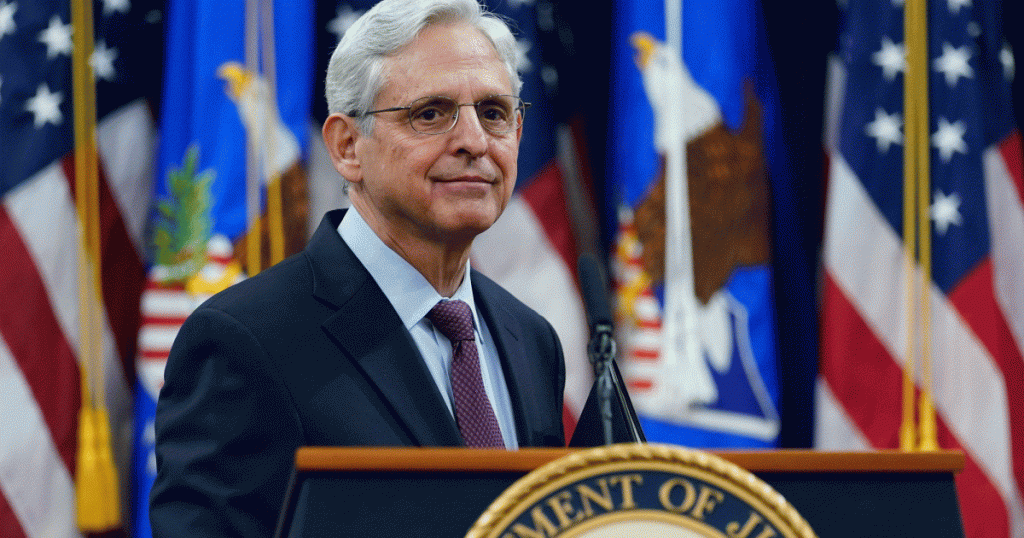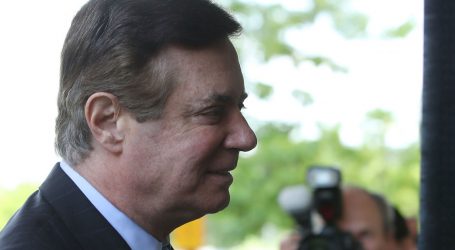Merrick Garland Should Tell Us if DOJ Is Investigating Trump for His Attempted Coup
Merrick Garland speaking at the Department of Justice in Washington on January 5, 2022.Carolyn Kaster/AP
Fight disinformation. Get a daily recap of the facts that matter. Sign up for the free Mother Jones newsletter.Editor’s note: This essay by David Corn first appeared in his newsletter, Our Land. But we wanted to make sure as many readers as possible have a chance to see it. Our Land is written by David twice a week and provides behind-the-scenes stories about politics and media; his unvarnished take on the events of the day; film, books, television, podcast, and music recommendations; interactive audience features; and more. Subscribing costs just $5 a month—but right now you can sign up for a free 30-day trial of Our Land here.
I don’t like repeating myself in this newsletter. In part because I want to believe that every word I write is fully absorbed by each reader and remembered for all time. But perhaps that’s not the case. Regardless, it’s time to reiterate and revisit a point I made in early January: Attorney General Merrick Garland should tell the American public if the Justice Department is investigating Donald Trump’s attempted coup.
We know the FBI has arrested and charged nearly 800 people with crimes related to the assault on the US Capitol that Trump incited. Many have pleaded guilty. The first trial of an accused 1/6 rioter began this week; in the dock is Guy Reffitt, an alleged member of the Three Percenters, a right-wing, anti-government militia outfit. He allegedly led a mob of assailants as they breached a police line. Other trials of January 6 marauders are coming. Yet what’s unknown is whether the Justice Department has been examining Trump and his insurrectionist intimates for their own efforts to overturn the election.
This week that question became more pointed. On Wednesday, the House select committee investigating the January 6 attack submitted a legal filing stating it had gathered evidence indicating that Trump, John Eastman, the conservative attorney who drafted a plan for Trump to block the Electoral College vote in order to stay in power, and their allies could be charged with federal crimes, including obstructing an official congressional proceeding and conspiracy to defraud the American people. This was the first time the committee had raised the prospect of a criminal investigation of Trump. The filing, seeking to enforce a subpoena the committee served on Eastman for documents and testimony, noted, “There is also evidence to support a good-faith, reasonable belief that…review of the [subpoenaed] materials may reveal that the President and members of his Campaign engaged in common law fraud in connection with their efforts to overturn the 2020 election results.”
This was a big deal—an official suggestion that Trump may have committed a crime in his post-election scheming with Eastman and others. It implied the Justice Department ought to be on this case, at least to give it a good look. There are other aspects of Trump’s war on democracy that may have violated the law. Trump’s post–Election Day phone call to Georgia officials pressing them to “find” him enough votes to win is under investigation by the Fulton County district attorney, Fani Willis. (She is scheduled to seat a grand jury on May 2.) And as I noted last August, Trump’s underhanded attempt to muscle the Justice Department into declaring the election fraudulent also might have been a crime. Norm Eisen, who was President Barack Obama’s ethics czar and co-counsel for the House Judiciary Committee during the first Trump impeachment, told me there are several federal statues Trump may have violated through his DOJ skullduggery.
As the New York Times pointed out Friday, it may be legally difficult to charge Trump with a federal crime: “Building a criminal case against Mr. Trump is very difficult for federal prosecutors, experts say, given the high burden of proof they must show, questions about Mr. Trump’s mental state and the likelihood of any decision being appealed, underlining the dilemma confronting the agency.” Yet so far there’s no sign that Garland’s gumshoes are even working any stretch of this beat. No leaks, no court filings—nothing indicating an investigation of Trump and his henchmen for their actions on, before, or after 1/6 to undermine or block the peaceful transfer of power.
Under normal circumstances, this is how the Justice Department is supposed to function: it does not state whether a person or entity is under investigation until there is an indictment. That’s a matter of fairness. A person who is not prosecuted ought not be branded as a suspect or target, for then he or she will not be afforded the chance to clear their name. (No trial, no way to prove you’re not guilty.) If the government identified people who might be indicted but who are ultimately not charged, it would have enormous power to tar individuals and do tremendous reputational harm to them.
Certainly, there are instances when it’s clear the FBI and the Justice Department are on the hunt. (Think Jeffrey Epstein.) Or times when word of an investigation leaks. (Hillary Clinton and the emails.) But the general rule—we don’t acknowledge investigations unless we bring a case—is a good one.
Yet as with all rules, there can be—and sometimes ought to be—exceptions. The question here is whether a sitting US president tried to illegally abuse his power to thwart the Constitution and undo democracy. That qualifies as a big deal. American citizens have a right to know that the Justice Department is taking this seriously and doing all that is reasonably possible to protect the republic. Garland should disclose, to a limited extent, his department’s activity (or lack thereof) on this front. Yes, that would mean treating Trump and his crew differently than the average citizen. But Justice Department rules are not absolute. There is a conflict: the rights of individuals possibly under investigation versus the right of the public to have faith its democracy is being safeguarded. With these stakes, the latter can outweigh the former and justify a limited exception to standard operating procedure. And there is another reason to break with the rule: Showing that a president who attempts to defy an election will face close legal scrutiny might just provide a disincentive to future despot-wannabes.
It could well be that experienced federal prosecutors might conclude there’s no solid case to mount against Trump and his abettors. But the public should be assured—officially—that the Justice Department is fully probing and considering the matter to make a determination. Maybe that is occurring right now—or maybe it has happened already. But we shouldn’t have to guess. On the question of whether a president—especially one who may run for the office again—is being investigated for attempting to criminally subvert American democracy, Garland ought to spill the beans.





